TL;DR
- AI dev agents now plan, code, test, and deploy, not just autocomplete
- McKinsey: AI tools cut coding time up to 55% and boost quality by 30%
- Flatlogic generates full-stack apps from a data model with full code ownership
- Picks include Devin, Codeium, Replit, Tabnine, Sweep; use cases span MVPs to enterprise
- Choose agents for reasoning, memory, debugging, CI/CD integration and on-prem options
Fact Box
- AI-powered development tools can reduce coding time by up to 55%. Source
- AI-powered development tools can increase software quality by 30%. Source
- Flatlogic builds full-stack apps from a data model and preserves full source code ownership. Source
- Flatlogic integrates with GitHub for version control and incremental updates. Source
- Codeium is free for individuals and offers on-prem deployment for enterprises. Source
AI is no longer just assisting developers – it’s building, debugging, and deploying software. Discover the top AI software development agents of 2025 and how they compare.
When searching for AI-driven development tools, you probably ask:
- Which AI software development agents can build and maintain entire applications?
- How do these AI software development agents compare to human developers regarding quality and efficiency?
- What are the best AI software development agents for startups, enterprises, and solo devs?
- Will AI replace software engineers, or is it just another overhyped trend?
As Andrej Karpathy, former director of AI at Tesla and a leading figure in AI research, puts it:
“The hottest new programming language is English.”
The rise of AI software development agents is not just a trend – it’s a seismic shift in software engineering. According to a 2024 study by McKinsey, AI-powered development tools can reduce coding time by up to 55% while increasing software quality by 30%. However, not all AI software development agents are created equal. Some excel at automating routine coding tasks, while others promise full autonomy but fall short in real-world applications. Understanding which tools deliver is crucial for developers and businesses alike.
At Flatlogic we specialize in AI-powered software development. We’ve spent years building and refining an AI-driven app generation platform, helping businesses create full-stack applications faster while maintaining full control over their code. Every day, we see firsthand how AI reshapes development, from accelerating MVP creation to automating complex enterprise solutions. Our team constantly evaluates AI tools, ensuring we stay ahead of the curve in AI-driven development.
By the end of this article, you’ll know the top AI software development agents in 2025 and how they compare. Which AI tools are best suited for different types of developers and companies? The future of AI in software development – and whether it’s replacing or enhancing human engineers. Let’s dive in. 
What are AI Software Development Agents?
AI software development agents are advanced AI-powered systems designed to autonomously generate, modify, debug, and deploy software with minimal human intervention. Unlike traditional AI-assisted coding tools that function as advanced autocompletes (e.g., GitHub Copilot), these AI software development agents take a more active role in software engineering by planning, executing, and optimizing development tasks across the entire software lifecycle.
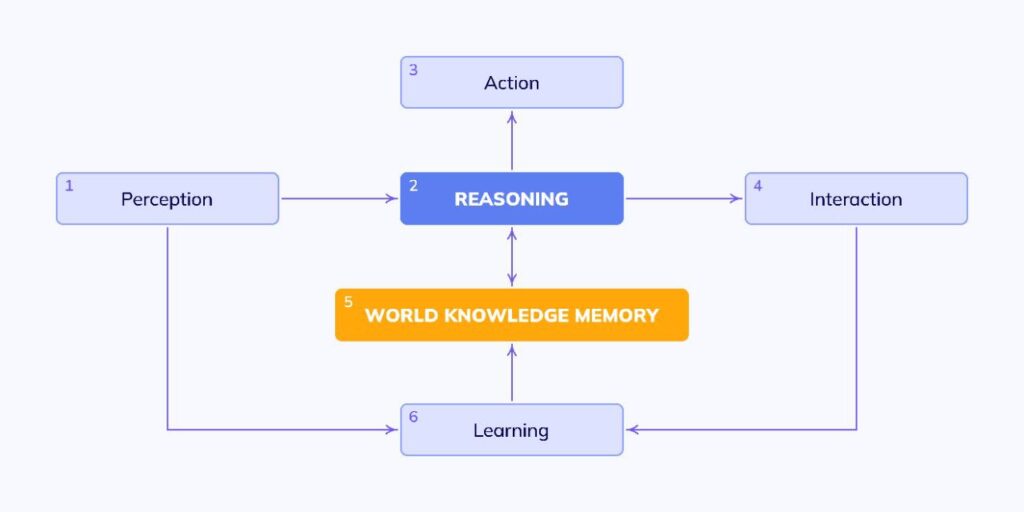
Key Characteristics of AI Software Development Agents
- Autonomy – Unlike simple code assistants, AI software development agents can handle end-to-end software tasks, from generating entire project structures to refining business logic.
- Adaptability – They can learn from user feedback, adjust to different coding styles, and even refactor or improve existing codebases.
- Multi-Stage Workflow Automation – Many AI software development agents are capable of handling multiple aspects of development, including requirement gathering, architecture planning, coding, testing, debugging, and deployment.
- Integration with Development Pipelines – AI software development agents can integrate into CI/CD workflows, collaborate with version control systems, and automate repetitive engineering tasks.
How AI Software Development Agents Differ from AI-Assisted Coding Tools
| Feature | AI Coding Assistants (e.g., Copilot) | AI Software Development Agents |
| Autonomy | Suggests code snippets | Writes and manages full applications |
| Context Awareness | Understands local code context | Understands the entire project architecture |
| Development Scope | Limited to inline suggestions | Handles architecture, debugging, and deployment |
| Human Involvement | Requires constant input | Can execute tasks independently |
Examples of AI Software Development Agents in Action
- Generating an entire CRUD-based web app from a simple prompt without requiring manual configuration.
- Fixing and refactoring existing code based on error messages and performance issues.
- Deploying applications autonomously, setting up infrastructure, and managing updates.
- Detecting security vulnerabilities and optimizing performance using AI-powered static analysis.
As AI technology advances, AI software development agents are evolving from helpers to fully capable autonomous engineers, changing how businesses build and maintain software. The key question is: which AI software development agents in 2025 deliver on these promises?
How to Choose the Right AI Software Development Agent
Selecting the best AI software development agent isn’t just about automation – it’s about compatibility, intelligence, and control. Here’s what truly matters when choosing the right tool.
Intelligence & Reasoning Capabilities
Not all AI software development agents think the same way. Some only generate code, while others can plan architectures, debug issues, and optimize performance.
- Basic AI: Predicts what code should come next based on context (e.g., Copilot).
- Intermediate AI: Understands function logic, suggests improvements, and refactors code.
- Advanced AI: Can analyze entire projects, identify inefficiencies, and restructure applications.
If you’re looking for true automation, go for AI software development agents with reasoning capabilities rather than simple code completion.
Context Awareness & Memory
AI is only useful if it remembers what it’s doing. Some AI software development agents process a few lines of code, while others can analyze and recall entire projects.
- Short-term memory: The AI software development agent only understands the current file.
- Long-term memory: AI software development agent remembers project history, dependencies, and previous changes.
- Project-wide context: AI software development agent understands your entire codebase, architecture, and logic flow.
The more context-aware the AI is, the better it can debug, refactor, and optimize code over time.
Debugging & Error Resolution
Writing code is easy – fixing it is the hard part. The best AI software development agents should detect, explain, and fix errors instead of just generating code.
- Can the AI software development agent identify syntax and logical errors?
- Does it explain why an error occurred instead of just providing a fix?
- Can it rewrite broken code intelligently without making things worse?
A strong debugging AI software development agent will reduce time spent troubleshooting and help maintain code quality.
Adaptability & Learning Ability
Does the AI software development agent improve over time, or does it repeat the same mistakes? The best AI agents:
- Learn from your coding style and adapt suggestions accordingly.
- Improve based on previous feedback and corrections.
- Can work with multiple coding paradigms (OOP, functional, declarative).
AI software development agent that remembers past interactions become more useful over time.
Architectural Understanding
Generating individual functions is one thing, but designing an entire application structure is another.
- Can the AI software development agent define relationships between different components?
- Does it understand modularization and scalability?
- Can it generate an entire project structure, not just isolated files?
If you’re building complex systems, you’ll want an AI software development agent that understands project-level architecture rather than just writing small code snippets.
Performance & Optimization
Bad AI-generated code is often bloated and inefficient. The best AI software development agents should:
- Suggest optimizations for faster execution.
- Identify redundant or unnecessary computations.
- Offer memory and performance improvements for scalability.
If the AI software development agent only writes code but doesn’t optimize it, you might spend more time cleaning up its output than actually coding.
Interaction Style & Command Execution
How does the AI software development agent take instructions?
- Text-based instructions: Works best for direct queries and simple modifications.
- Natural language processing: Understands broader requests (e.g., “Create a REST API with JWT authentication”).
- Multi-step execution: Can the AI software development agent plan and execute a series of commands without step-by-step guidance?
A smarter AI software development agent understands high-level instructions and can execute complex actions without needing constant micromanagement.
Customization & Fine-Tuning
Prebuilt AI models work well, but the best tools adapt to your specific project.
- Can you fine-tune the AI on your codebase?
- Does it allow custom rules and constraints?
- Can it integrate project-specific documentation for smarter suggestions?
The more control you have over the AI’s behavior, the more useful it becomes in real-world development.
The best AI software development agent is not just an autocomplete tool – it’s an intelligent partner that understands, adapts, and improves. Instead of generating isolated code snippets, prioritize AI software development agent that offers real reasoning, deep memory, debugging capabilities, and architecture-level understanding. The goal isn’t to replace developers – it’s to augment their capabilities with real AI-driven intelligence.
The Top 10 AI Software Development Agents in 2025
AI software development agents are redefining the way applications are built, tested, and deployed. Below is a ranking of the top 10 AI-powered development agents in 2025, highlighting their capabilities, use cases, pricing, and overall strengths.
Flatlogic AI Software Development Agent
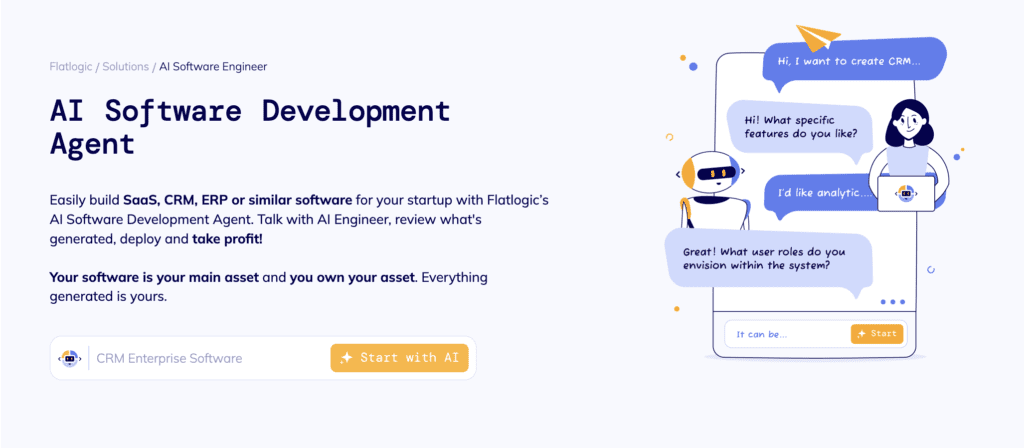
Flatlogic’s AI Software Development Agent is an advanced platform designed for businesses, startups, and developers who need to generate fully functional applications quickly. Unlike traditional AI coding assistants, Flatlogic does not just provide snippets of code, it builds entire full-stack applications, including databases, authentication, front-end, and deployment pipelines. It allows users to define a data model upon which the AI automatically generates the entire application structure. One of its major strengths is that users retain complete access to and control over the generated source code, making it a hybrid between low-code convenience and full-code flexibility. Additionally, Flatlogic integrates with GitHub for version control, ensuring seamless collaboration and incremental updates.
Use Cases
- Startups: Rapid MVP development to test market fit.
- Businesses: Automating the creation of internal tools, CRMs, and ERP systems.
- Developers: Accelerating project setup by automating repetitive coding tasks.
Pricing & Availability
Flatlogic offers a free trial, with paid plans available as a one-time fee or subscription-based pricing for more advanced features.
Codeium AI
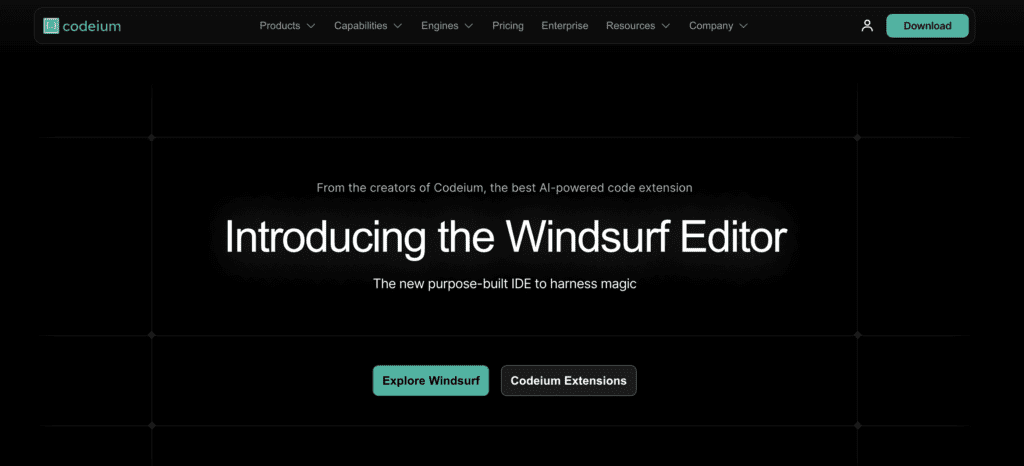
Codeium AI is an AI-powered software development agent designed to enhance coding efficiency across multiple programming languages. Unlike traditional AI coding assistants, Codeium offers fast, lightweight, and context-aware code completion, making it a preferred tool for developers who need an intelligent AI that adapts to their workflow without heavy system overhead. It integrates seamlessly with IDEs and supports on-premises deployment for enterprises requiring privacy and security.
Use Cases
- AI-assisted development: Accelerates coding with intelligent, real-time suggestions.
- Multi-language support: Works with Python, JavaScript, Go, C++, and more.
- Enterprise-grade security: Offers self-hosted deployment for privacy-focused teams.
Pricing & Availability
Free for individual developers, with enterprise pricing available for team and on-premise deployment.
Devin (Cognition AI)
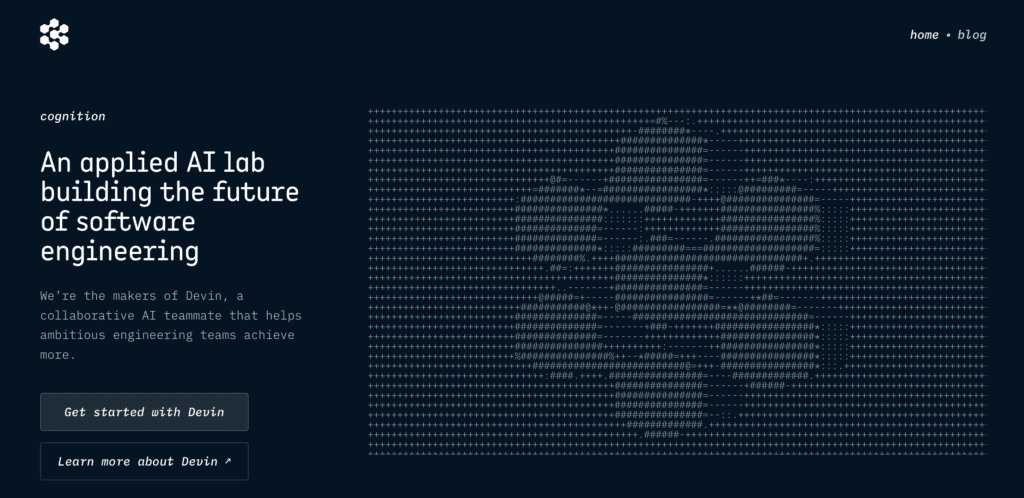
Devin is an AI software engineer that autonomously writes, debugs, and executes code with minimal human intervention. Unlike standard AI coding tools, Devin operates at a higher level, capable of reasoning about software projects and executing multi-step coding tasks without continuous oversight. It can identify and resolve software bugs, optimize performance, and refactor entire codebases without requiring developer input. This level of autonomy makes Devin particularly valuable for teams looking to automate significant portions of their development workflows. However, it is still in early-stage deployment, with limited availability for enterprise users.
Use Cases
- Automating software engineering workflows, from code creation to debugging.
- Enhancing software reliability through AI-driven error detection and optimization.
- Assisting in large-scale software projects where autonomous agents can reduce manual workload.
Pricing & Availability
Enterprise pricing with limited beta access.
Lovable
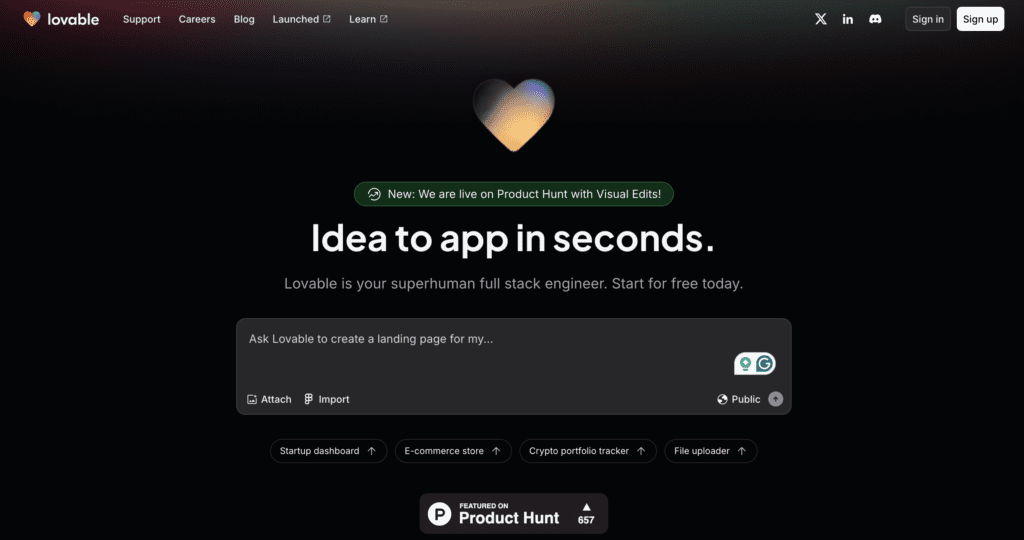
Lovable is an AI-powered software development platform that focuses on generating high-order components rather than just raw code. It enables businesses and developers to rapidly build modular and scalable applications by automating the creation of core application structures. Unlike traditional AI code assistants, Lovable works at a more abstract level, assembling pre-optimized components into functional systems. This approach reduces technical debt and speeds up the development of enterprise applications. While it is still evolving, Lovable is positioned as a significant alternative for teams looking for AI-driven development with greater flexibility and modularity.
Use Cases
- Automating the development of modular, scalable software applications.
- Reducing development time by using AI to generate high-order application components.
- Enhancing maintainability and flexibility in enterprise software projects.
Pricing & Availability
Subscription-based with enterprise options.
Replit AI
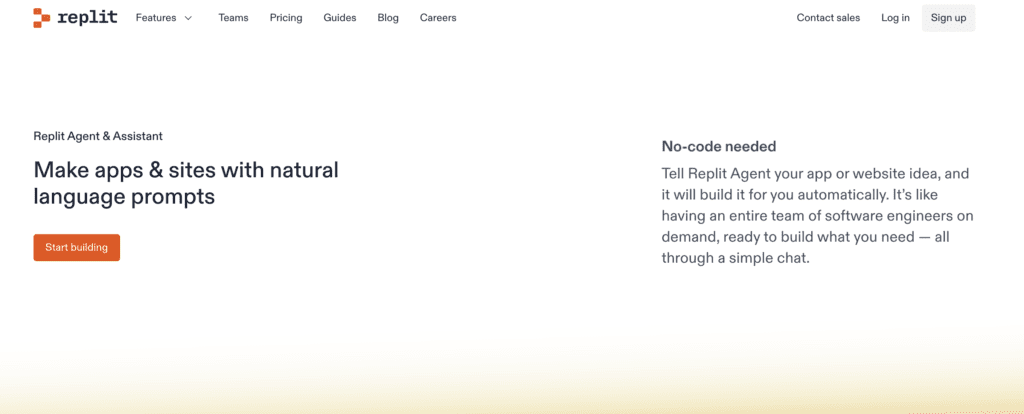
Replit AI is an AI-driven software development platform that combines cloud-based collaboration with AI-assisted coding and project management. Unlike many AI coding assistants, Replit AI takes a more holistic approach, integrating AI engineering principles into the software development lifecycle. Developers can use it to automate project setup, manage dependencies, and even deploy applications directly from the platform. This makes it an ideal solution for solo developers, startups, and teams looking to streamline the software development process. Additionally, Replit AI supports multi-language development, allowing flexibility for various software engineering needs.
Use Cases
- Enabling AI-driven software development in a cloud-based collaborative environment.
- Automating software deployment and dependency management.
- Reducing friction in multi-developer collaboration through AI-enhanced workflow automation.
Pricing & Availability
A freemium model with paid plans for advanced features.
Qodo
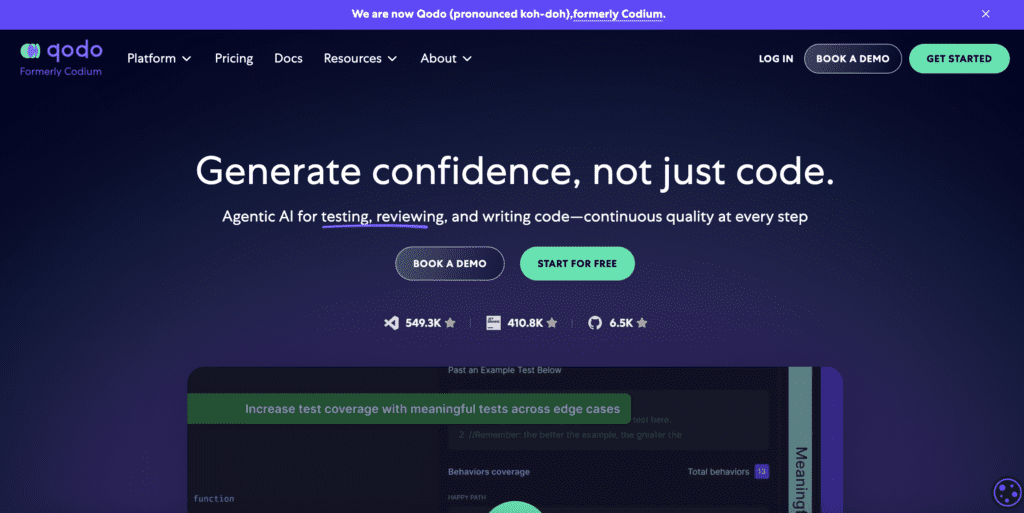
Qodo is an advanced AI engineer who assists developers with software analysis, autonomous debugging, and optimization. It goes beyond standard AI assistants by interpreting the logic behind the code and suggesting refactoring strategies. Qodo provides deep insights into software quality and performance, allowing teams to address bottlenecks proactively. The AI’s ability to reason about system architecture makes it valuable for enterprises looking to enhance their code reliability. It is particularly useful for large-scale projects where maintaining software integrity is crucial.
Use Cases
- Enhancing software quality through AI-powered refactoring suggestions.
- Automating large-scale debugging processes.
- Optimizing system performance by analyzing architectural inefficiencies.
Pricing & Availability
Subscription-based, with enterprise plans available.
Tabnine AI
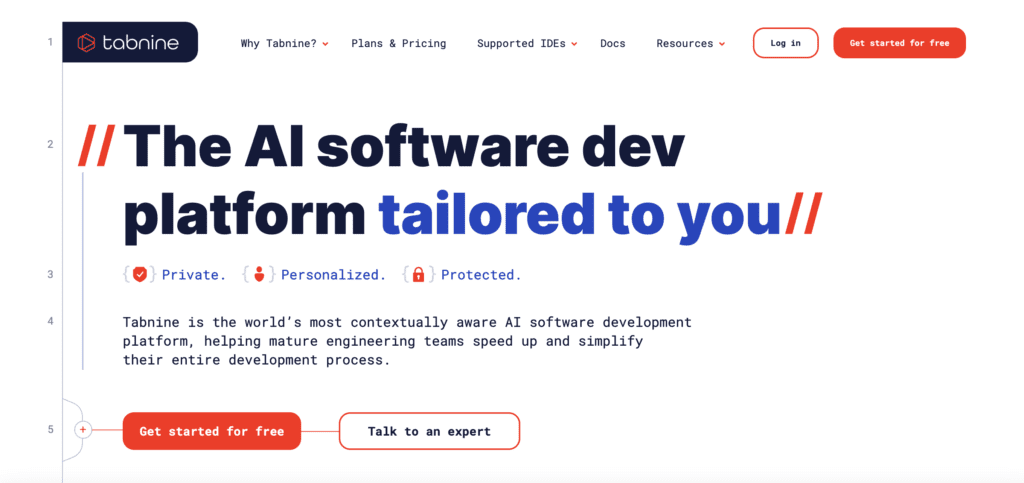
Tabnine AI is an AI-powered software development agent designed for teams and enterprises looking to accelerate coding while maintaining security and compliance. Unlike generic AI code assistants, Tabnine runs on private cloud or on-premise environments, ensuring sensitive code remains secure. It provides real-time code suggestions, automates repetitive coding tasks, and integrates with enterprise workflows to enhance developer productivity without sacrificing control.
Use Cases
- Enterprise software development: Secure AI-powered coding for large teams.
- Code consistency: Ensuring standardized coding practices across teams.
- Security-conscious environments: AI development without exposing code to external AI models.
Pricing & Availability
Custom enterprise pricing with private cloud/on-prem deployment options.
Sweep AI
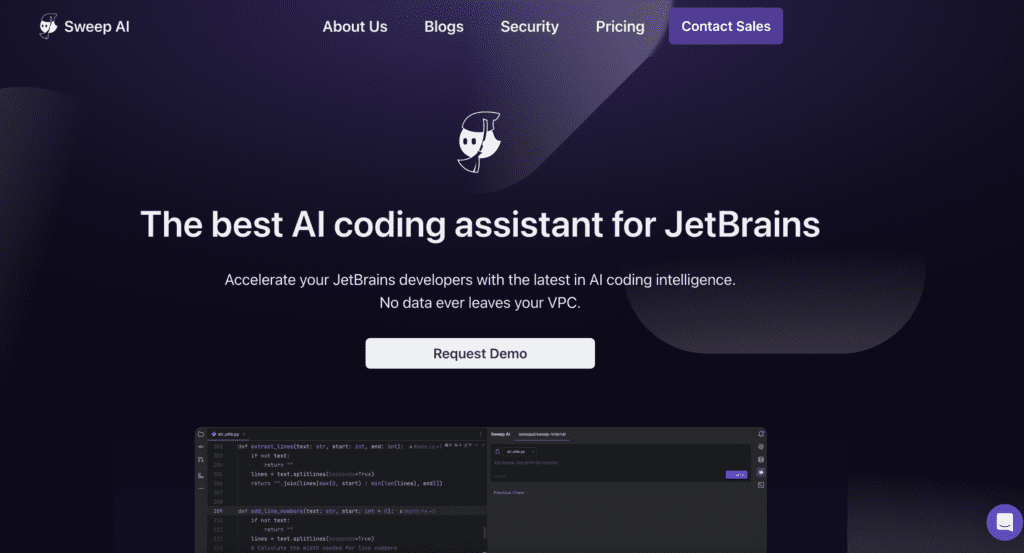
Sweep AI is an autonomous AI agent focused on managing and resolving software development issues, primarily aimed at bug fixing and refactoring. It integrates with repositories like GitHub to detect issues, suggest fixes, and even submit pull requests automatically. By reducing manual debugging time, Sweep AI helps teams focus on feature development rather than maintenance.
Use Cases
- Automated bug fixing: Detects and resolves software issues autonomously.
- Codebase refactoring: Optimizes legacy code for better maintainability.
- Continuous integration: Works with GitHub to automate fixes via pull requests.
Pricing & Availability
Subscription-based pricing with enterprise options.
DeepMind AlphaCode
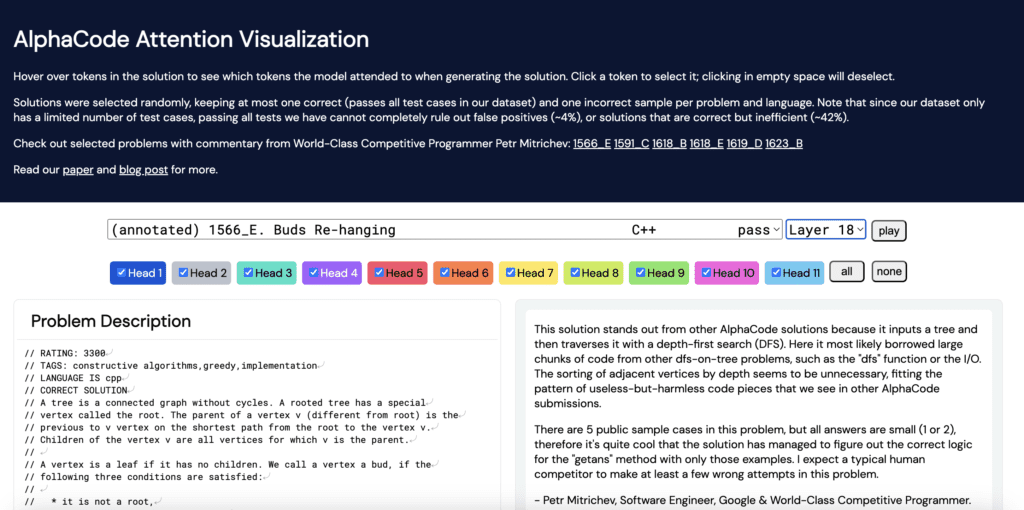
AlphaCode is a cutting-edge AI engineer developed by DeepMind that is designed to solve complex programming challenges and generate innovative software solutions. It is trained on large-scale datasets and can generate full application logic based on high-level descriptions. AlphaCode stands out by competing in human-level coding competitions, showcasing its ability to develop optimal and efficient algorithms. It is especially valuable for research-driven projects and competitive programming environments. While still in its early stages, it presents a major step toward fully autonomous software engineering.
Use Cases
- Developing AI-driven algorithmic solutions.
- Assisting in high-level software design.
- Competing in and automating competitive programming challenges.
Pricing & Availability
Limited research access, with potential future enterprise applications.
Polaris AI
Polaris AI is a next-generation AI software development agent specializing in real-time software architecture optimization and autonomous software engineering. It goes beyond traditional coding assistance by continuously analyzing software projects, identifying bottlenecks, and restructuring code for optimal efficiency. Polaris AI is particularly useful for large enterprise applications that require high performance and scalability. Its deep integration with cloud platforms allows it to suggest real-time adjustments to codebases, optimizing runtime performance dynamically. Companies leveraging Polaris AI can expect improved system resilience, faster development cycles, and reduced maintenance costs.
Use Cases
- Real-time software performance optimization.
- Automating system scalability and resilience improvements.
- AI-driven refactoring and architecture restructuring.
Pricing & Availability
Enterprise subscription-based pricing.
The AI software development agents landscape is rapidly evolving, with tools like Flatlogic, Devin, and Lovable pushing the boundaries of autonomous software engineering. These AI software development agents go beyond simple coding assistance, offering capabilities like full-stack automation, AI-driven debugging, and component-based software generation. As AI continues to advance, the role of AI software development agents in automating complex development workflows will become increasingly significant.
AI Software Development Agents: The Future of Development
AI software development agents are rapidly reshaping the software engineering landscape by automating complex processes that traditionally require extensive human effort. These AI software development agents are not just assisting developers, they are actively participating in software creation, debugging, optimization, and deployment. The rise of AI software development agents means that businesses can reduce development time, improve code quality, and enhance productivity at an unprecedented scale.
With advances in machine learning, AI models are now capable of reasoning about software architecture, suggesting refactors, and even autonomously managing software projects. The future will likely see AI engineers collaborating closely with human developers to handle the repetitive and intricate aspects of coding, allowing teams to focus on innovation and strategic decision-making. Organizations that adopt AI software development agents will gain a significant competitive advantage, reducing costs and accelerating product delivery.
Why AI Software Development Agents are Ideal for Startups and SMBs
For startups and small-to-medium businesses (SMBs), AI software development agents offer a unique advantage by significantly reducing the barriers to entry for software creation. Traditional software development requires extensive resources, including hiring developers, project managers, and QA testers, which can be costly for smaller companies. AI software development agents allow startups and SMBs to automate many of these tasks, reducing the need for large development teams and cutting costs.
AI software development agents also enable startups to quickly build and iterate on MVPs (Minimum Viable Products), allowing them to test market fit without investing months into development. SMBs can leverage these tools to streamline internal operations, develop custom applications tailored to their business needs, and remain agile in a competitive environment. Additionally, AI-driven software agents help bridge technical skill gaps by providing intelligent suggestions, automated debugging, and end-to-end development assistance, making sophisticated application development accessible even to non-technical founders.
By integrating AI software development agents, startups and SMBs can scale their operations more efficiently, accelerate time-to-market, and focus on their core business goals rather than getting bogged down in software engineering complexities.
Conclusion
AI software development agents are no longer just assisting developers – they are actively building, debugging, and deploying software. Companies that integrate AI into their development process gain a competitive edge by accelerating product delivery, reducing costs, and streamlining workflows.
While AI won’t fully replace developers yet, businesses that leverage AI for automation while retaining control over architecture and decision-making will move faster and stay ahead. The key is using AI as a force multiplier, handling routine tasks so teams can focus on strategy and innovation.
For companies looking to build business software efficiently without sacrificing control, Flatlogic AI Software Development Agent automates application development while ensuring full source code ownership. Start building today.